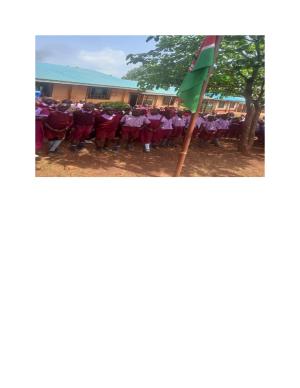Ebukobelo Primary School
Breakdown:
- Accommodation and food: 0.00 Euro
- Transportation: 0.00 Euro
- Activities: 0.00 Euro
- Hosting organisation support: 300 Euro

Description: The school was founded in 2016 and the pupils’ enrolment is 444 pupils, 226 boys and 218 girls. The school has 15 teachers teaching right from the early childhood education, primary school and junior primary school. The school has six permanent and four semi-permanent classrooms, staffroom and an administration block. The school is located on 0.9 acres that has adequate room for expansion. It is located in a densely populated area in Vihiga county of Western Kenya, an area that receives rainfall throughout the year and hence the local community members are food sufficient as the communal land is utilized for small-scale agriculture that is the foremost economic driver of the people at the grassroots
Type of Work: • Teaching • Playing with children • Brick making and sand harvesting • Home visits • Inter-cultural education to foster global cooperation
Study Theme: • Girls’ education goes beyond getting girls into school. It is also about ensuring that girls learn and feel safe while in school; complete all levels of education with the skills to effectively compete in the labor market; learn the socio-emotional and life skills necessary to navigate and adapt to a changing world; make decisions about their own lives; and contribute to their communities and the world. • Girls’ education is a strategic development priority. Better-educated women tend to be healthier, participate more in the formal labor market, earn higher incomes, have fewer children
Accommodation: • The host community will provide a house to accommodate the volunteers with basic living conditions. • Volunteers have an obligation to climb down the level of the people with the aim of exposure to development challenges. • KVDA will provide foodstuffs and volunteers will cook their own meals in turns. • Water is available from springs and it is recommended that drinking water should be boiled or medicated. • Mineral water available at supermarkets is recommended. • There is electricity connection at the project and solar energy in case of power outages and the volunteers can charge ele
Language: English is the language of the work camp. There will be a possibility of learning Kiswahili and other international and local languages, as cultural diversity is a major component in international service
Requirements: What to carry? This is outlined in the detailed info sheet and includes, sleeping bag and mat, toiletries, torch/flashlight, sandals, mosquito net, national flag from your country, among others DONATION AND GIFTS: These are usually symbolic gestures to enhance the solidarity of volunteers and the hosting community. Kindly contact KVDA for details in case you are willing to support a worthy cause
Approximate Location: It is located in a densely populated area in Vihiga county of Western Kenya, Emuhaya Constituency, an area that receives rainfall throughout the year and hence the local community members are food sufficient as the communal land is utilized for small-scale agriculture that is the foremost economic driver of the people at the grassroots
Notes: • Girls’ education goes beyond getting girls into school. It is also about ensuring that girls learn and feel safe while in school; complete all levels of education with the skills to effectively compete in the labor market; learn the socio-emotional and life skills necessary to navigate and adapt to a changing world; make decisions about their own lives; and contribute to their communities and the world. • Girls’ education is a strategic development priority. Better-educated women tend to be healthier, participate more in the formal labor market, earn higher incomes, have fewer children, marry at a later age, and enable better health care and education for their children, should they choose to become mothers. All these factors combined can help lift households, communities, and nations
